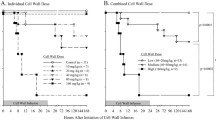Abstract
Probiotic-rich foods are consumed without much restriction. We report here, a case of septic shock caused by yogurt derived Lactobacillus species in a 54-year-old male patient with acute promyelocytic leukemia, in second complete remission, and who was an autologous stem cell transplantation recipient. He received high dose chemotherapy and autologous peripheral blood stem cell transplantation. He ingested commercially available probiotic-enriched yogurt because of severe diarrhea. One week later, he developed septic shock, and the pathogen was determined by strain-specific PCR analysis as Lactobacillus rhamnosus GG (ATCC 53103), which was found to be identical with the strain in the yogurt he consumed. Thus, because even low virulent Lactobacilli in the probiotic products can be pathogenic in the compromised hosts, ingestion of such products should be considered with caution in neutropenic patients with severe diarrhea, such as stem cell transplantation recipients.

Similar content being viewed by others
References
Salminen S, von Wright A, Morelli L, Marteau P, Brassart D, de Vos WM, Fondén R, Saxelin M, Collins K, Mogensen G, Birkeland SE, Mattila-Sandholm T (1998) Demonstration of safety of probiotics -- a review. Int J Food Microbiol 44:93–106
Wells JM (2011) Immunomodulatory mechanisms of lactobacilli. Microb Cell Factories 10(Suppl 1):S17
Srinivasan R, Meyer R, Padmanabhan R, Britto J (2006) Clinical safety of lactobacillus casei shirota as a probiotic in critically ill children. J Pediatr Gastroenterol Nutr 42:171–173
Antony SJ, Stratton CW, Dummer JS (1996) Lactobacillus bacteremia: description of the clinical course in adult patients without endocarditis. Clin Infect Dis 23:773–778
Griffiths JK, Daly JS, Dodge RA (1992) Two cases of endocarditis due to lactobacillus species: antimicrobial susceptibility, review, and discussion of therapy. Clin Infect Dis 15:250–255
Sussman JI, Baron EJ, Goldberg SM, Kaplan MH, Pizzarello RA (1986) Clinical manifestations and therapy of lactobacillus endocarditis: report of a case and review of the literature. Rev Infect Dis 8:771–776
Land MH, Rouster-Stevens K, Woods CR, Cannon ML, Cnota J, Shetty AK (2005) Lactobacillus sepsis associated with probiotic therapy. Pediatrics 115:178–181
Vahabnezhad E, Mochon AB, Wozniak LJ, Ziring DA (2013) Lactobacillus bacteremia associated with probiotic use in a pediatric patient with ulcerative colitis. J Clin Gastroenterol 47:437–439
Mehta A, Rangarajan S, Borate U (2013) A cautionary tale for probiotic use in hematopoietic SCT patients-lactobacillus acidophilus sepsis in a patient with mantle cell lymphoma undergoing hematopoietic SCT. Bone Marrow Transplant 48:461–462
Ward LJ, Timmins MJ (1999) Differentiation of lactobacillus casei, lactobacillus paracasei and lactobacillus rhamnosus by polymerase chain reaction. Lett Appl Microbiol 29:90–92
Ahlroos T, Tynkkynen S (2009) Quantitative strain-specific detection of lactobacillus rhamnosus GG in human faecal samples by real-time PCR. J Appl Microbiol 106:506–514
Salminen MK, Rautelin H, Tynkkynen S, Poussa T, Saxelin M, Valtonen V, Järvinen A (2004) Lactobacillus bacteremia, clinical significance, and patient outcome, with special focus on probiotic L. rhamnosus GG. Clin Infect Dis 38:62–69
Fenicia L, Anniballi F, Aureli P (2007) Intestinal toxemia botulism in Italy, 1984-2005. Eur J Clin Microbiol Infect Dis 26:385–394
Howard FM, Flynn DM, Bradley JM, Noone P, Szawatkowski M (1977) Outbreak of necrotising enterocolitis caused by clostridium butyricum. Lancet 2:1099–1102
Kimura SI, Fujita H, Kato H, Hiramoto N, Hosono N, Takahashi T, Shigeno K, Hatsumi N, Minamiguchi H, Miyatake J, Handa H, Akiyama N, Kanda Y, Yoshida M, Kiyoi H, Miyazaki Y, Naoe T; Japan Adult Leukemia Study Group (JALSG). (2017) Management of infection during chemotherapy for acute leukemia in Japan: a nationwide questionnaire-based survey by the Japan Adult Leukemia Study Group. Support Care Cancer. Jun 6. https://doi.org/10.1007/s00520-017-3775-8
Gardner A, Mattiuzzi G, Faderl S, Borthakur G, Garcia-Manero G, Pierce S, Brandt M, Estey E (2008) Randomized comparison of cooked and noncooked diets in patients undergoing remission induction therapy for acute myeloid leukemia. J Clin Oncol 26:5684–5688
Moody K, Finlay J, Mancuso C, Charlson M (2006) Feasibility and safety of a pilot randomized trial of infection rate: neutropenic diet versus standard food safety guidelines. J Pediatr Hematol Oncol 28:126–133
van Tiel F, Harbers MM, Terporten PH, van Boxtel RT, Kessels AG, Voss GB, Schouten HC (2007) Normal hospital and low-bacterial diet in patients with cytopenia after intensive chemotherapy for hematological malignancy: a study of safety. Ann Oncol 18:1080–1084
Author information
Authors and Affiliations
Consortia
Corresponding author
Ethics declarations
Conflicts of Interest
On behalf of all authors, the corresponding author states that there are no conflicts of interest. The authors declare that the final manuscript has not been published before and the work is not under consideration for publication elsewhere.
Informed Consent
Written informed consent was obtained from the patient for publication of this case report. A copy of the written consent may be requested for review from the corresponding author.
Rights and permissions
About this article
Cite this article
Koyama, S., Fujita, H., Shimosato, T. et al. Septicemia from Lactobacillus rhamnosus GG, from a Probiotic Enriched Yogurt, in a Patient with Autologous Stem Cell Transplantation. Probiotics & Antimicro. Prot. 11, 295–298 (2019). https://doi.org/10.1007/s12602-018-9399-6
Published:
Issue Date:
DOI: https://doi.org/10.1007/s12602-018-9399-6




